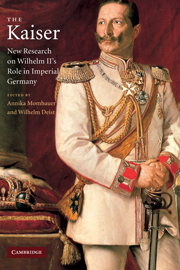Book contents
- Frontmatter
- Contents
- Notes on contributors
- Acknowledgements
- List of abbreviations
- Introduction
- Reflections on John Röhl: a Laudatio
- 1 Wilhelm II and ‘his’ navy, 1888–1918
- 2 Hollow-sounding jubilees: forms and effects of public self-display in Wilhelmine Germany
- 3 The Kaiser's elite? Wilhelm II and the Berlin administration, 1890–1914
- 4 Wilhelm, Waldersee, and the Boxer Rebellion
- 5 Dreams of a German Europe: Wilhelm II and the Treaty of Björkö of 1905
- 6 The uses of ‘friendship’. The ‘personal regime’ of Wilhelm II and Theodore Roosevelt, 1901–1909
- 7 Military diplomacy in a military monarchy? Wilhelm II's relations with the British service attachés in Berlin, 1903–1914
- 8 Wilhelm II as supreme warlord in the First World War
- 9 Germany's ‘last card’. Wilhelm II and the decision in favour of unrestricted submarine warfare in January 1917
- 10 Military culture, Wilhelm II, and the end of the monarchy in the First World War
- 11 Rathenau, Wilhelm II, and the perception of Wilhelminismus
- 12 Structure and agency in Wilhelmine Germany: the history of the German Empire – past, present, and future
- Index
Reflections on John Röhl: a Laudatio
Published online by Cambridge University Press: 24 July 2009
- Frontmatter
- Contents
- Notes on contributors
- Acknowledgements
- List of abbreviations
- Introduction
- Reflections on John Röhl: a Laudatio
- 1 Wilhelm II and ‘his’ navy, 1888–1918
- 2 Hollow-sounding jubilees: forms and effects of public self-display in Wilhelmine Germany
- 3 The Kaiser's elite? Wilhelm II and the Berlin administration, 1890–1914
- 4 Wilhelm, Waldersee, and the Boxer Rebellion
- 5 Dreams of a German Europe: Wilhelm II and the Treaty of Björkö of 1905
- 6 The uses of ‘friendship’. The ‘personal regime’ of Wilhelm II and Theodore Roosevelt, 1901–1909
- 7 Military diplomacy in a military monarchy? Wilhelm II's relations with the British service attachés in Berlin, 1903–1914
- 8 Wilhelm II as supreme warlord in the First World War
- 9 Germany's ‘last card’. Wilhelm II and the decision in favour of unrestricted submarine warfare in January 1917
- 10 Military culture, Wilhelm II, and the end of the monarchy in the First World War
- 11 Rathenau, Wilhelm II, and the perception of Wilhelminismus
- 12 Structure and agency in Wilhelmine Germany: the history of the German Empire – past, present, and future
- Index
Summary
My ancient Dr Smith's Smaller Latin–English Dictionary defines a Laudatio as ‘a praising commendation, a eulogy or a panegyric’, and that is what I intend to write in the next few pages. This pleasant task has its difficulties. I have no distance, either temporal or personal, from the subject. I propose to comment on the work of a distinguished colleague, who is a direct contemporary (we started graduate study together) and a friend. I am also quite unashamedly an admirer. What John Röhl has accomplished demands that ‘praising commendation’ which Dr Smith suggested. His is an unusual career, which indeed deserves to be heartily commended.
The electronic catalogue at the University of Pennsylvania's Van Pelt Library lists eleven titles under John Röhl's name. All of them deal with the political history of the German Empire from 1888 to 1918. John Röhl has spent his entire career and his very considerable intellectual energies on ‘Germany after Bismarck’, as he called his first book. Thirty years of history have been the subject of nearly forty years of research and writing. The ratio of life to subject must be unusual, though not unique. In American history, crowded with practitioners as it is, careers spent on the Civil War, Jacksonian Democracy, the New Deal or the Second World War occur frequently and there the ratio of life to subject is even more dramatic.
- Type
- Chapter
- Information
- The KaiserNew Research on Wilhelm II's Role in Imperial Germany, pp. 6 - 11Publisher: Cambridge University PressPrint publication year: 2003



